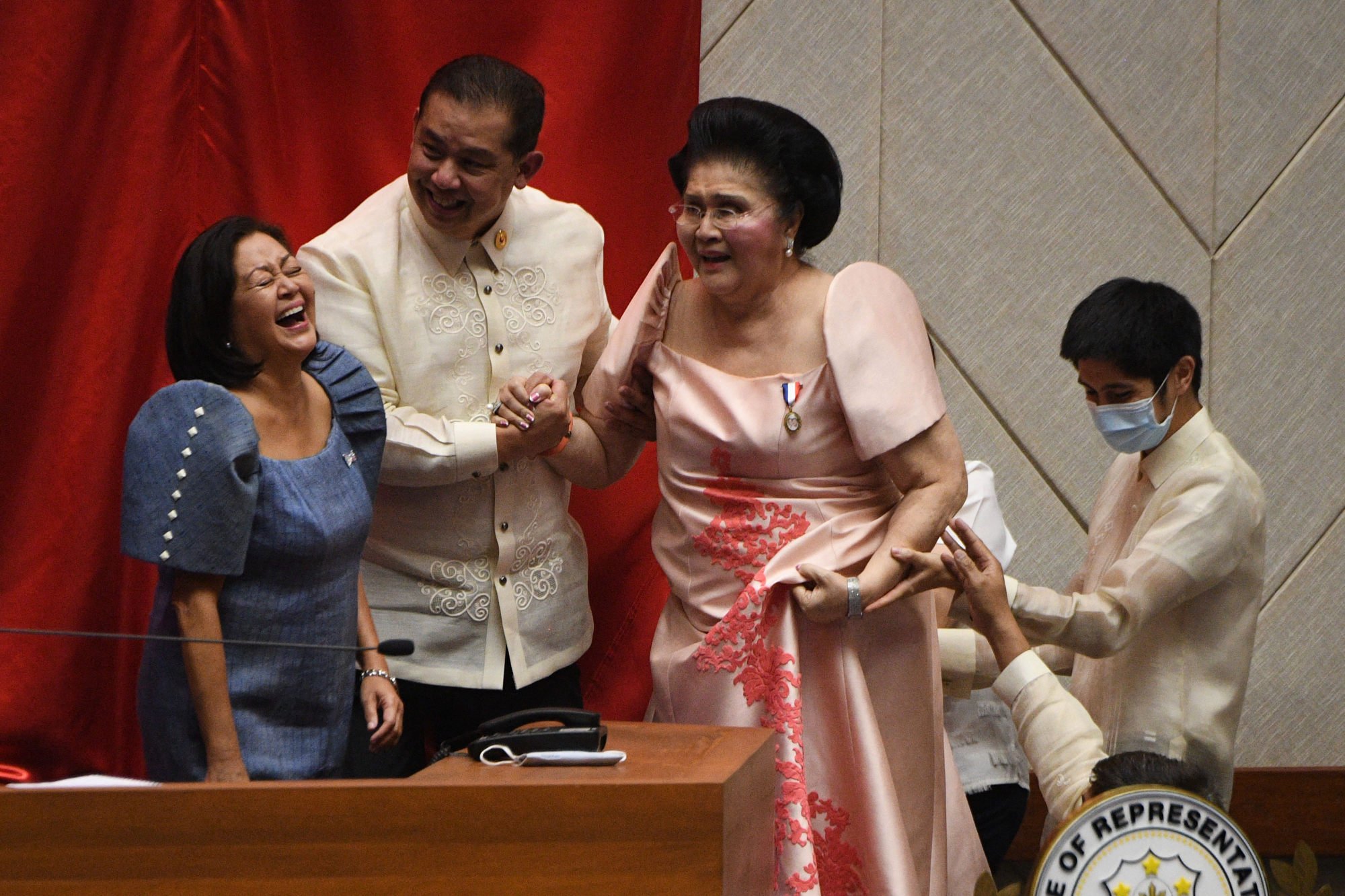Is Marcos’ plan to amend Philippine constitution for China deal a ploy to keep his family in power?
[ad_1]
Marcos Jnr himself ran for the presidency under the banner of Partido Federal ng Pilipinas whose major advocacy is to establish a federal form of government. Human rights activists are particularly suspicious of his charter change because Marcos Jnr’s late dictator-father entrenched himself in power by calling for a constitutional convention then grabbing control of its process after imposing martial rule.
The resulting 1973 constitution enabled the senior Marcos to stay in power for another 13 years because he installed a weak parliament while retaining himself as president with the power to amend the charter and make laws.
Call for diplomacy with China reveals rift among Philippine business leaders
Call for diplomacy with China reveals rift among Philippine business leaders
Ruling party Senator Francis Tolentino made it clear on Tuesday that he was backing the charter change “so we can explore and develop the natural resources in the West Philippine Sea”. He said the country could only do this “with the help of investments from another country whose technology and equipment we need in order to drill, extract and convert” oil and gas deposits.
The lawyer-senator also stated in the press release that a “less restrictive development of West Philippine Sea must be included [in the charter change] to help ease prices of basic commodities in the country”.
Tolentino did not detail the constitutional edit he had in mind, nor did he mention that drilling for gas and oil in the WPS – an area under Manila’s sovereign rights according to a 2016 international arbitration ruling – has stalled since 2011 due to Beijing’s opposing maritime claims.
Both countries have been trying to hammer out a deal since 2018 but on June 23, 2022, then-foreign secretary Teodoro Locsin Jnr announced that talks were “terminated completely … one step forward from where we stood on the edge of the abyss is a drop into constitutional crisis”.
He did not elaborate but his successor Enrique Manalo later hinted that China had demanded certain conditions be in line with its domestic law, though these would run afoul of the Philippine constitution.

Legal, defence and security experts interviewed by This Week in Asia, however, cautioned lawmakers over the implications of amending the charter just to accommodate China.
Retired Supreme Court associate justice Adolfo Azcuna, who was among those who drafted the 1973 and 1987 constitution, said he agreed with the move to relax the charter’s economic provisions to increase foreign ownership in corporations exploiting natural resources.
He stressed, though, that any amendment should “not change the bedrock principle …that all such resources belong to the [Philippine] state”.
“The problem with China is that its current position is that it has sovereignty over the territory involved and we must recognise it as a prerequisite to a joint venture. That would not be allowable,” Azcuna said.
He explained that the country’s previous constitutions framed in 1935 and 1973 also contained the same restriction because of “the nature of the resources as non-renewable or limited and therefore its development and utilisation should best be limited to our own nationals. This is recognised under international law” and is stated in the International Covenant on Economic, Social and Cultural Rights.
Philippines stands out in Asean over embrace of US’ Indo-Pacific strategy
Philippines stands out in Asean over embrace of US’ Indo-Pacific strategy
But retired supreme court associate justice Antonio Carpio said he completely opposed amending this part of the charter to allow a Chinese state-owned exploration firm to come in as a joint venture partner of the Philippine government and not just as its “service contractor”, which is the only option the current charter allows.
“I do not agree,” he said. “Joint venture partner can mean China co-owns our EEZ [exclusive economic zone]. If the amendment will result in China co-owning our oil and gas, that’s terrible.”
He added that insofar as sharing of the profits was concerned, “this can be done without amending the constitution [since] the Philippine government, which directly undertakes the oil and gas exploration, can give a 50 or even 60 per cent share in the profits in payment for the services of the service contractor”.
Carpio also voiced suspicions that “the real reason [for charter change] is to convert the present presidential system to a parliamentary system to perpetuate their control of the national government”, referring to the family of Marcos Jnr and his cousins on his mother’s side, the Romualdez clan.
University of the Philippines law professor Jay Batongbacal also saw no need to amend the same section, pointing out that a 2004 Supreme Court ruling “already allows 100 per cent foreign ownership of financial technical assistance agreements for petroleum, minerals, and mineral oils exploration and exploitation”.
Batongbacal, director of the university’s Institute for Maritime Affairs and Law of the Sea, noted “other foreign service contractors accept that such resources belong to the Philippines and they comply with Philippine law”.
He warned that China would “likely use [any oil deal] as an excuse for persistent presence and conduct of other activities of its own” in the contract service area.
While retired navy rear admiral Rommel Jude Ong would not comment on the legal aspects of enabling a joint venture (JV) deal with China by amending the constitution, he said: “The only scenario I am concerned with a JV, the Chinese Communist Party might use [it] as an excuse to deploy Chinese Coast Guard vessels at the Reed Bank on the premise of securing the exploration site.” Ong was referring to the tablemount that lies in the West Philippine Sea.
“Anyway we will see, if they agree to a JV that recognises our sovereign rights over Reed Bank, and that it’s part of our EEZ, maybe that would be a good starting point for de-escalation in the WPS.”
But Ong, who now serves as Professor of Praxis with the Ateneo School of Government, added: “Even if we have a JV with CCP at Reed Bank, I do not think it will dissuade them from pursuing their maritime ambition in the SCS. They will still conduct coercive activities in the WPS in pursuit of their exaggerated claim of sovereignty beyond their territory.”
‘Urgent we start now’: Philippines to explore oil-rich sea amid China tension
‘Urgent we start now’: Philippines to explore oil-rich sea amid China tension
Max Montero, a Filipino-Australian systems consultant for a foreign military organisation who runs the popular blog MaxDefense Philippines, also said in an interview on Friday that he disagreed with any joint deal.
“China proved to have vested interest to have these locations for itself, and this could affect trust and confidence, and their sincerity to work with the Philippines … that they might do something unacceptable,” he explained. “There will be security implications because, again related to a lack of sincerity on their part, as well as their vested interest in where these projects are located.
“China might have more reason to bring in their coast guard, militia and navy itself to deploy closer to our shores inside our EEZ.”
Defence and security analyst Jose Antonio Custodio also told This Week in Asia that the joint venture with China “legitimises and recognises their illegal claims in the WPS [and would be] rewarding them for illegal and bad behaviour and will only encourage them to be more aggressive in the future”.
However, Custodio – a fellow at the Consortium of Indo-Pacific Researchers – conceded there were “legitimate reasons” for amending other parts of the charter “in matters of improving economic performance”.
Philippines to ramp up military ties amid China’s ‘gutter-level talk’: minister
Philippines to ramp up military ties amid China’s ‘gutter-level talk’: minister
While not openly coming out in support of Senator Tolentino’s move, the Foundation for Economic Freedom said on Thursday it was backing a “review” for lifting “Filipino-only restrictions” on ownership of land and the exploitation of natural resources.
Previous attempts to change the charter have failed but this time, a petition to amend through a “People’s Initiative” could be submitted to the Commission on Elections as early as next week and a nationwide plebiscite could be held this July, according to House and Ways committee chairman Jose Salceda.
Marcos’ allies have adopted a two-step process to amend the charter. If the plebiscite on the People’s Initiative amendment succeeds, this would compel the 315-member House of Representatives and the 24-member Senate to vote “jointly” for any constitutional amendment, instead of “separately”, as the Senate has always insisted.
The Marcos-Romualdez-controlled House could then call for the convening of a Constituent Assembly – where senators are overwhelmingly outnumbered – and amend the constitution as it pleases.

The pushback against such moves is growing, however, and now includes strange bedfellows – the president’s eldest sister Senator Imee Marcos and those who had fought her late dictator-father, as well as former President Rodrigo Duterte, legal luminaries and cause-oriented groups who once thwarted Duterte’s charter change attempt.
In an apparent change of his position, Duterte voiced his opposition to the proposed charter amendments and said last week: “We have a good constitution. I find it in perfect condition. There is absolutely nothing wrong with it.”
On Friday, Vice-President Sara Duterte released a statement denouncing proponents of the People’s Initiative whom she accused of “giving out cash in exchange for signatures in [her hometown] Davao City and other parts of the country. This is a reflection of many politicians’ fondness for buying votes in every election”.
She urged fellow officials to put the people’s welfare first “instead of the entry of foreigners into the country”.
The president’s eldest sister Imee Marcos said on January 12 that in this period of rising prices of oil, rice and basic goods, “it’s not timely”.
“Maybe, someone who can’t win a presidential election wants to become a prime minister,” she said in an apparent dig at her cousin, House Speaker Martin Romualdez.
[ad_2]
Source link

